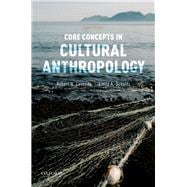
Core Concepts in Cultural Anthropology
by Lavenda, Robert H.; Schultz, Emily A.Buy New
Buy Used
Rent Textbook
Rent Digital
Downloadable: 180 Days
Downloadable: 365 Days
Downloadable: Lifetime Access
This item is being sold by an Individual Seller and will not ship from the Online Bookstore's warehouse. The Seller must confirm the order within two business days. If the Seller refuses to sell or fails to confirm within this time frame, then the order is cancelled.
Please be sure to read the Description offered by the Seller.
Summary
Author Biography
Robert H. Lavenda is Professor Emeritus of Anthropology at St. Cloud State University.
Emily A. Schultz is Professor of Anthropology at St. Cloud State University.
Table of Contents
Preface
Chapter 1. Anthropology
1.1 An Anthropological Perspective
1.2 The Subfields of Anthropology
1.3 Is Anthropology a Science? Modernism, Postmodernism, and Beyond
1.4 Reflexive Anthropology
1.5 Moral Anthropology
Chapter 2. Culture
2.1 Culture Against Racism: The Early Twentieth Century
2.2 The Evolution of Culture
2.3 Culture and Symbolism
2.4 Ethnocentrism and Cultural Relativism
2.5 The Boundaries of Culture?
2.6 The Concept of Culture in a Global World: Problems and Practices
2.7 Culture: Contemporary Discussion and Debate
2.8 Culture: A Contemporary Consensus
Chapter 3. Meaning-Making and Language
3.1 Making Meaning
3.2 Studying Language: A Historical Sketch
3.3 The Building Blocks of Language
3.4 Language and Culture
3.5 Language and Society
3.6 Discourse
3.7 Language Contact and Change
3.8 Meaning-Making and Art
3.9 The Anthropology of Media and the Arts
Chapter 4. Worldview and Religion
4.1 Religion
4.2 Myth
4.3 Ritual
4.4 Magic and Witchcraft
4.5 Religious Practitioners
4.6 Change in Religious Systems
4.7 Secularism, Fundamentalism, and New Religious Movements
Chapter 5. The Dimensions of Social Organization
5.1 What Is Social Organization?
5.2 Dimensions of Social Organization
5.3 Caste and Class
5.4 Race
5.5 Ethnicity
Chapter 6. Sex, Gender, and Sexuality
6.1 Sex, Gender, and Feminism in the Twentieth Century
6.2 Sex, Gender, Race, and Class
6.3 Gender Performativity
6.4 Theoretical Diversity in Studies of Sex and Gender
6.5 Sex, Gender, and the Body
6.6 Sex, Gender, and Sexuality
6.7 Sex, Gender, and Sexuality in Ethnographic Context
Chapter 7. Relatedness: Kinship, Marriage, Family, and Friendship
7.1 Kinship Versus Biology
7.2 Descent
7.3 Bilateral Descent
7.4 Unilineal Descent
7.5 Kinship Terminologies
7.6 What Is Marriage?
7.7 Whom to Marry and Where to Live
7.8 How Many Spouses?
7.9 Marriage as Alliance
7.10 Family
7.11 Divorce
7.12 Friendship
Chapter 8. Political Anthropology
8.1 Power
8.2 Political Ecology and Political Economy
8.3 Disputes and Dispute Resolution
8.4 Forms of Political Organization
8.5 Social Stratification
8.6 Forms of Political Activity
8.7 Social Control and Law
8.8 Nationalism and Hegemony
Chapter 9. Economic Anthropology
9.1 The "Arts of Subsistence"
9.2 Subsistence Strategies
9.3 Explaining the Material Life Processes of Society
9.4 Modes of Exchange
9.5 Production, Distribution, and Consumption
9.6 Mode of Production
9.7 Peasants
9.8 Consumption
9.9 The Anthropology of Food and Nutrition
Chapter 10. Globalization
10.1 The Cultural Legacy of Colonialism
10.2 Analyzing Sociocultural Change in the Postcolonial World
10.3 Globalization
10.4 The Cultural Effects of Contact
10.5 Globalization, Citizenship, and Human Rights
10.6 Global Assemblages
Chapter 11. The Anthropology of Science, Technology, and Medicine
11.1 Science and Anthropology
11.2 Anthropology, Science, and Technology
11.3 The Anthropology of Medicine
11.4 Human Health in Evolutionary Context
11.5 Human Health and Nutrition
11.6 Health and Human Reproduction
11.7 Sickness and Health in the Global Capitalist Economy
Chapter 12. Theory in Cultural Anthropology
12.1 Anthropology as Science
12.2 Nineteenth-Century Approaches
12.3 Early-Twentieth-Century Approaches
12.4 Mid-Twentieth-Century Approaches
12.5 Late-Twentieth-Century Debates
12.6 New Directions in the Twenty-First Century
Appendix: Reading Ethnography
The Parts of an Ethnography
The Use of Indigenous and Local Terms
The Photographs
Why Are You Reading This Ethnography (and How Should You Read It)?
Bibliography
Index
An electronic version of this book is available through VitalSource.
This book is viewable on PC, Mac, iPhone, iPad, iPod Touch, and most smartphones.
By purchasing, you will be able to view this book online, as well as download it, for the chosen number of days.
A downloadable version of this book is available through the eCampus Reader or compatible Adobe readers.
Applications are available on iOS, Android, PC, Mac, and Windows Mobile platforms.
Please view the compatibility matrix prior to purchase.
